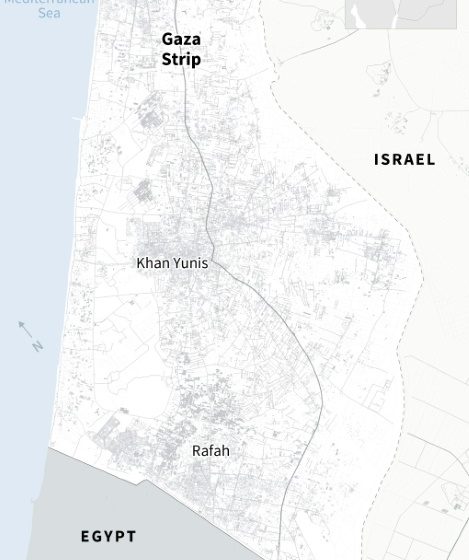As Palestinian deaths in Gaza top 25,000, Hamas defends attacks that sparked war

Southern Gaza Strip
– Palestinian militant group Hamas on Sunday defended its October 7 attacks on Israel but admitted to “faults” and called for an end to “Israeli aggression” in Gaza, where the health ministry said the death toll passed 25,000.
Southern Gaza is the latest focus of Israel’s battle to destroy the Islamist group responsible for the deadliest attack in the country’s history.
In its first public report on the attacks that began the war, Hamas said they were a “necessary step” against Israeli occupation of Palestinian territories, and a way to secure release of Palestinian prisoners.
Israeli Prime Minister Benjamin Netanyahu later vowed “complete victory” and said his government would not accept Hamas’s conditions for releasing hostages still held in Gaza.
Hamas’s 16-page report admitted “some faults happened… due to the rapid collapse of the Israeli security and military system, and the chaos caused along the border areas with Gaza”.
The report did not make clear why it was issued now, more than three months into the war that began when militants broke through Gaza’s militarised border to attack Israelis and foreigners in the streets, in their homes and at an outdoor rave party.
This resulted in the deaths of about 1,140 people, mostly civilians, according to an AFP tally based on official Israeli figures.
With the border fence broken during the attacks, anybody could enter Israel.
Accounts of sexual violence emerged but the scarcity of survivor testimonies and the lack of forensic evidence made it difficult to assess their scale.
– Naval bombardment –
Militants seized about 250 hostages during the attacks, and Israel says around 132 remain in Gaza. At least 28 of them are believed to have been killed, according to an AFP tally based on Israeli figures.
Hamas — considered a “terrorist” group by the United States and European Union — said in the report its fighters were committed to “Islamic values”, and if civilians were targeted “it happened accidently and in the course of the confrontation with the occupation forces.”
In response to the attacks, Israel has launched a military offensive that has killed at least 25,105 people in Gaza, mostly women and children, according to the latest toll issued on Sunday by the health ministry in Hamas-run Gaza.
In early January, Israel’s military said the Hamas command structure in northern Gaza had been dismantled, leaving only isolated fighters.
But witnesses told AFP Israeli vessels were bombarding Gaza City and other areas in the north early Sunday. Hamas has also reported heavy combat in the north.
The Israeli army said it “eliminated a number of terrorists” in the main southern city of Khan Yunis and killed 15 militants in northern Gaza over the past day.
Netanyahu is under intense pressure to return the hostages and account for security failings surrounding the October attacks.
In a video statement released after the Hamas report, he said that “in exchange for the release of our hostages, Hamas demands an end to the war, the withdrawal of our forces from Gaza”, the release of Palestinian prisoners and guarantees that Hamas would stay in power.
“If we accept this, our soldiers have fallen in vain,” Netanyahu said. “If we accept this, we won’t be able to guarantee the safety of our citizens.”
The United Nations says about 1.7 million people have been displaced in Gaza, with about one million crowded into the Rafah area of Gaza’s south near Egypt.
– Donkey carts –
UN agencies have warned better aid access is needed urgently as famine and disease loom. Gazans are also struggling with shortages of water, medical care and other essentials.
With fuel scarce, they have increasingly turned to donkey carts for transport.
“Anyone who used to own a car now uses a donkey. Even businessmen or officials try to collect money just to buy a donkey,” said Badr al-Akhras, a trader of the beasts.
Diplomatic efforts have sought to secure scaled-up aid deliveries for Gaza and a truce, after a week-long cessation of hostilities in November saw Hamas release dozens of hostages in exchange for Palestinian prisoners held by Israel.
Hamas’s Qatar-based chief Ismail Haniyeh held a meeting with the Turkish foreign minister, diplomatic sources said on Sunday, in the first official contact between the two for more than three months.
Among their discussion was “a two-state solution for a permanent peace,” one of the sources said.
The United States and Arab countries are also seeking such a solution involving Palestinian statehood, but Netanyahu has rejected it, saying “Israel must retain security control over Gaza”.
Britain’s Defence Secretary Grant Shapps on Sunday called it “disappointing actually, to hear that from the Israeli prime minister.”
Hamas in its report rejected any international and Israeli efforts to decide Gaza’s post-war future.
Israel’s northern border with Lebanon has seen near-daily exchanges of fire between Israeli forces and the Iran-backed Hezbollah movement.
On Sunday an Israeli drone strike on a car in southern Lebanon killed a Hezbollah fighter, a security official and a source close to the group told AFP. Israel said its warplanes bombed Hezbollah targets in southern Lebanon.
Also adding to fears of wider conflict, a strike on Saturday killed Iran’s Revolutionary Guards’ (IRGC) Syria spy chief in Damascus, Iran’s Mehr news agency said. Iran blamed Israel.
The White House said it was taking “extremely seriously” a weekend attack by Iran-backed militants using “multiple ballistic missiles and rockets” against a base hosting US forces in Iraq.
Dozens of such attacks in Iraq and Syria have taken place since mid-October and most have been claimed by militants opposing US support for Israel, but the use of ballistic missiles marked an escalation.
